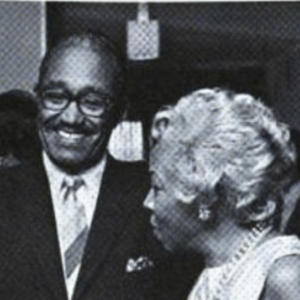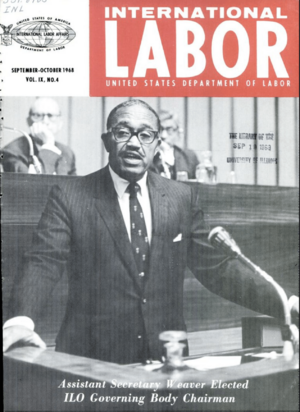George L. P. Weaver facts for kids
George Leon-Paul Weaver (born May 18, 1912 – died July 14, 1995) was an important American leader. He worked to improve conditions for workers and fought for civil rights. Civil rights mean equal rights for all people, no matter their race or background. George Weaver helped people in the United States and around the world.
He served as a top government official, working for Presidents Kennedy and Johnson. He was the Assistant Secretary of Labor for International Affairs. Later, he became the first American to lead the main board of the UN's International Labour Organization (ILO). This organization helps workers globally. He also received a special award from Malaysia for his great service.
Contents
Early Life and Learning
George Weaver was born in Pittsburgh, Pennsylvania. He grew up in Dayton, Ohio. He went to college at what is now Roosevelt University in Chicago. He also studied law at Howard University. In 1962, Howard University gave him an honorary law degree. This was a special award for his achievements.
Starting His Career
In the 1930s, George Weaver worked as a railway porter. This job involved helping passengers on trains. While working, he joined a union called the United Transport Services Employees (UTSE). A union is a group of workers who join together to protect their rights.
In 1942, his union joined a larger group called the CIO. After this, George Weaver became an assistant to a top CIO leader. In 1943, he was chosen to lead a new CIO committee. This committee was called the Committee to Abolish Racial Discrimination (CARD). It was the first time the CIO put a Black person in such a high leadership role.
In 1955, the CIO joined with another big union group, the AFL. Together, they formed the AFL–CIO. George Weaver then became the executive secretary of their Civil Rights Committee.
Fighting for Equality
In 1948, George Weaver attended an important meeting at the Pentagon. This meeting was about ending segregation in the US military. Segregation meant keeping people of different races separate. Everyone at the meeting agreed that the military needed to end this practice.
Soon after, President Truman issued an order. This order, called Executive Order 9981, stopped discrimination in the US Armed Forces. It helped bring people of all races together in the military during the Korean War.
Working Around the World
Starting in 1950, George Weaver began working on international labor issues. He helped a government official named W. Stuart Symington. Symington said Weaver was very helpful in stopping unfair price increases for tin.
During the 1950s, George Weaver traveled a lot. He worked for the International Confederation of Free Trade Unions (ICFTU). His goal was to help labor leaders in other countries. He built strong relationships with leaders in places like Okinawa, Singapore, and Malaysia.
He also represented the US workers at conferences for the UN's International Labour Organization (ILO) in 1957 and 1958. The ILO works to improve working conditions and rights for people worldwide.
In 1958, George Weaver joined a different union, the International Union of Electrical, Radio and Machine Workers. He became an assistant to the president, focusing on political education and international programs.
Political and Later Career
George Weaver helped unions support political candidates. For the 1960 presidential election, he first supported Stuart Symington. When Symington was no longer running, Weaver supported John F. Kennedy.
Serving in Government
In January 1961, President Kennedy chose George Weaver for a big job. He became the Assistant Secretary of Labor for International Affairs. After Kennedy passed away, President Johnson kept Weaver in this important role. He served in this position until 1969.
From 1961 to 1969, George Weaver led the US team at the yearly International Labour Organization (ILO) conference. In 1968, he was chosen by everyone to lead the ILO's main board for a year. After his term ended, he continued to work for the ILO. He served as a special assistant to the Director-General and represented the ILO in Washington, DC.
Special Awards
In the 1960s, George Weaver received honors for his work with labor leaders in Southeast Asia. In 1963, he was the first American to receive a special award from Malaysia. It was called "Honorary Commander" in the Order of the Defender of the Realm. This award recognized his excellent service to the country.
In 1968, the government of South Vietnam also gave him two civilian awards. These were the Kim Khanh Medal (Second Class) and the Labor Medal (First Class). These awards showed how much his work was valued internationally.
 | Jewel Prestage |
 | Ella Baker |
 | Fannie Lou Hamer |



